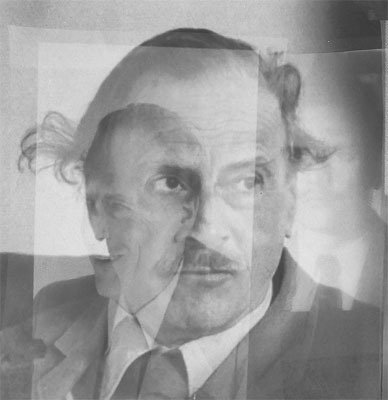Two multimedia exhibitions
dal 28/9/2011 al 15/11/2011
Segnalato da
28/9/2011
Two multimedia exhibitions
Canadian Cultural Centre, Paris
A new technological portrayal turned into the future about an important intellectual figure of the 20th century. Working with his ideas about acoustic and visual space, Lewis Kaye and David Rokeby recreate the atmosphere of Marshall McLuhan's legendary Monday night seminars. Robert Bean contextualizes McLuhan's writing process within a framework of obsolete electronic technologies.

Curator: Bonnie Rubenstein
The Canadian Cultural Centre presents, from September 30 to November 16, two multimedia exhibitions dedicated to Marshall McLuhan, showing a new technological portrayal turned into the future about this major intellectual figure of the 20th century.
2011 marks the centenary of Marshall McLuhan's birth. Born July 21, 1911 in Edmonton, Alberta, McLuhan became a literary and media icon of extraordinary renown; no figure is more universally associated with the rise of media, information, and our transformation into a digital society. Every passing year, relentless changes in the world deepen our appreciation of the power and scope of his vision.
The School of Communication at the University of Toronto was for a time a crucial intellectual centre and the McLuhan Program in Culture and Technology, commonly known as the "Coach House", was a hotbed of ideas. From 1963 until his death in 1980, McLuhan conducted his groundbreaking research on the nature of communication, media and technology at the "Coach House." At seminars held there on Monday evenings, he refined his ideas and made cross-disciplinary leaps and connections. In attendance were artists and scholars from a wide range of disciplines. They shared a common understanding that the mediated world requires analysis of the most fundamental epistemic, ontological and metaphysical assumptions.
Lewis Kaye and David Rokeby
Through the Vanishing Point
To reflect on the enduring significance of Marshall McLuhan and the relevance of his theories, Canadian artists Lewis Kaye and David Rokeby were commissioned to create site-specific works at the "Coach House" for the Photography Festival in Toronto CONTACT 2010: Pervasive Influence. As the framework of the installation they drew from Marshall McLuhan's book Through the Vanishing Point: Space in Poetry and Painting (coauthored by Harley Parker), 1968, which explores the way electronic media fragments the homogenous experience of space.
Presenting two separate but complementary works in the exhibition Through the Vanishing Point, Kaye and Rokeby aurally and visually reconstruct McLuhan's presence. Working with his ideas about acoustic and visual space, the artists recreate the atmosphere of McLuhan's legendary Monday night seminars. Kaye and Rokeby have adapted the exhibition for a site-specific installation at the Canadian Cultural Centre.
Lewis Kaye's six-channel sound composition uses archival recordings of the seminars —audience murmurs, discussions as well as interviews—to evoke McLuhan and the history and aurality of the atmosphere at the "Coach House." David Rokeby's multi screen projection features images sourced from archival photographs and video recordings of McLuhan's seminars, personal life, television appearances and public lectures.
Commissioned by the Scotiabank CONTACT Photography Festival and the McLuhan Program in Culture and Technology of the Faculty of Information Coach House Institute, University of Toronto.
Robert Bean
Illuminated Manuscripts
To commemorate the iconic visionary Marshall McLuhan and celebrate the centenary of his birth, Canadian artist Robert Bean was commissioned to create a site-specific exhibition in McLuhan's former seminar room at the Coach House for CONTACT 2011: Figure + Ground.
Illuminated Manuscripts is a project about writing, archives and photography. It emphasizes the figure/ground relationship that is physically inscribed on the surface of Marshall McLuhan's documents and manuscripts. Bean contextualizes McLuhan's writing process within a framework of obsolete electronic technologies. He presents a selection of recent photographs of objects in the collection of the Canadian Science and Technology Museum —such as the telegraph, dictaphone, and typewriter— alongside new video works that animate 100 of McLuhan's original documents from the collection of the Library and Archives Canada.
Organized by the Scotiabank CONTACT Photography Festival, McLuhan100, the McLuhan Program in Culture and Technology of the Faculty of Information Coach House Institute, University of Toronto.
Press contact:
Jean Baptiste Le Bescam +33 1 44432148 | fax +33 1 44432199 jean-baptiste.lebescam@international.gc.ca
Opening: 29 September, 6pm
Centre culturel canadien - Canadian Cultural Centre
5, rue de Constantine - 75007 Paris
Accès: Métro et RER: Invalides, Bus: 28, 49, 63, 69, 83, 93
Opening hours:
Monday–Friday, 10am–6pm, Thursday, 10am–7pm
Free entrance



